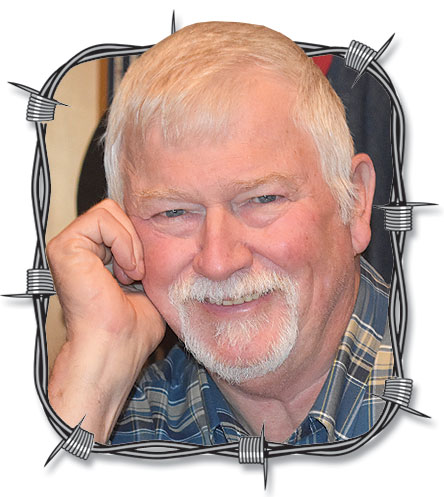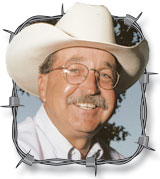I used to be amused by Dad’s leisurely daily routine.
“Amused” may be too mild. I sometimes thought it ludicrous. As editor of the newspaper I kept a list of things to do each and every day, both in and outside the office – meetings to cover, people to interview, photos to take, stories to write and the relentless pressure of deadlines to meet.
Dad’s routine was a mite different from mine. At around age 32 – just a little older than me when I became editor of the Buffalo Reflex – Dad traded his full time job as an artificial inseminator to become a full time dairy farmer on 39 acres of brush, and he never again worked a regular job. Over the years he earned extra money as a sign painter and a cow breeder, but whatever he chose to do was on his terms, not an employer’s.
That’s not to imply Dad didn’t work hard. He did, and he made sure we did, putting up hay, cutting brush and firewood, building fence, milking cows and anything else required.
Dad was not lazy. He was independent.
The chores seemed endless when I was a boy. In summer, for example, by the time the last little hayfield was in the barn it was time to go back for a second cutting of the first. And, of course, the weeds and brush never stopped growing and fences never ceased needing repairs.
Dad sold all his milk cows in the early 1970s, while I was off in the U.S. Air Force, saving one for the house. So, he still had twice-daily milking, but not much else. He also had horses and a few beeves to feed (too many horses and too few calves), as well as a passel of hounds, but it was all of his choosing. Nobody told him he had to have any of them, and they didn’t much interfere with his fishing.
After I settled into the newspaper business – starting with the Bolivar Herald-Free Press in 1976 and then to the Buffalo Reflex in 1978 – I found a lot more time to visit Dad than when I had been in college or working in restaurants. Dad was still pretty heavily involved with horses and then cattle, but I always understood when I stopped by the farm I crossed into another time zone – There was Daylight Savings Time, Central Time and “Dad Time.” The latter started on the eastern edge of Dallas County, extending to all corners of Dad’s 39 acres and anywhere else his old pickup truck would take us.
I learned to get used to it. I didn’t stop by the farm unless I had time to kill. Dad was in his 50s when he had quadruple heart bypass surgery.
He was pretty well mended, but still not up to lifting much when I learned a trip to the feed mill in Marshfield could take half a day right out of the middle. It started with coffee at the farm, a trip to the mill (and a stop for gas in Elkland), a good bit of visiting with the fellow on the dock, and then lunch at the little cafe across the road. Once back at the farm, Dad went in to put on the coffee while I pulled the truck down to the barn and unloaded the feed. Back at the house, then, we talked a spell about mostly nothing but big plans, and drank coffee until Dad decided, “Well, be chore time soon. Better get started feeding the horses. They have to be fed in a certain order, you know…. Ol’ Bess here and Black Rose there and….”
Even if it wasn’t exactly as I’ve told it, it was close.
It used to frustrate me – slowing down to Dad Time. I came to appreciate it more and more as time passed. And as Dad slowed, so did his schedule. I didn’t really get it, though, until after I retired.
I better understand how one thing to do can take a day. Maybe I’m just now learning retirement.
I’ve not yet got the knack of following “Dad Time,” but I haven’t been practicing nigh as long as he did. Give me a couple more years and might get it down.
I’ll know I’m almost there when my daughter complains, “Dad! You’re getting as bad as Grandpa was.”
“Not quite, Hon, but I’m workin on it.”
Copyright 2024, James E. Hamilton; email [email protected]. Read more of his works in Ozarks RFD 2010-2015, available online from Amazon, Barnes & Noble or from the author.







